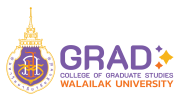Biological of Cancer: 6 Must-Know Advances for Oncology Experts with College of Graduate Study at Walailak University
The ever-evolving landscape of cancer biology demands that oncology experts stay informed of the latest breakthroughs. At the College of Graduate Study at Walailak University, scholars specializing in Tropical Medicine are contributing significantly to cancer research, addressing the molecular, genetic, and environmental factors that drive oncogenesis. With a strong emphasis on biostatistics and mathematical modeling, Ph.D. researchers are advancing innovative strategies to understand and combat cancer more effectively. This article highlights six critical advances in cancer biology that every oncology expert should know.
1. Genomic and Molecular Characterization of Tumors
Cancer research has shifted towards genomic profiling, allowing for precise molecular subtyping of tumors. Ph.D. researchers at Walailak University employ next-generation sequencing (NGS) to identify genetic mutations responsible for cancer progression, particularly in tropical regions where unique carcinogenic factors exist. Their research informs personalized medicine, enabling targeted therapies tailored to an individual’s genetic profile.
2. Immune System Modulation and Immunotherapy
The immune system plays a pivotal role in cancer prevention and treatment. Checkpoint inhibitors, CAR-T cell therapy, and cancer vaccines have emerged as revolutionary treatment options. Scholars at Walailak University investigate the immune response to various tropical infections and its implications for oncogenesis. Their findings contribute to improving immunotherapeutic strategies, ensuring more effective and durable responses in cancer patients.
3. Microbiome and Cancer Interactions
Recent studies highlight the role of the human microbiome in influencing cancer susceptibility and treatment outcomes. Researchers at Walailak University focus on the gut-liver axis and its impact on hepatocellular carcinoma, a prevalent cancer in tropical regions. Their studies on microbial dysbiosis provide insights into how gut bacteria modulate immune function and tumor growth, leading to novel microbiome-based therapeutic interventions.
4. Mathematical Modeling for Tumor Progression and Treatment Optimization
Biostatistics and mathematical modeling play a crucial role in understanding tumor dynamics. Ph.D. scholars at the university employ predictive modeling techniques to analyze cancer progression patterns and assess treatment responses. Their work in drug resistance modeling aids in optimizing chemotherapy regimens, reducing toxicity, and improving overall patient survival rates.
5. Cancer Biomarkers for Early Detection and Prognosis
The discovery of novel biomarkers is essential for early cancer detection and monitoring disease progression. Researchers at Walailak University are pioneering liquid biopsy techniques, utilizing circulating tumor DNA (ctDNA) and exosomal biomarkers to detect cancer at its earliest stages. Their work is particularly relevant for tropical medicine, where early diagnosis can significantly improve patient outcomes.
6. Natural Compounds and Phytochemicals in Cancer Treatment
With Thailand’s rich biodiversity, Walailak University’s researchers explore the potential of natural compounds as anticancer agents. Their studies on bioactive phytochemicals derived from traditional medicinal plants demonstrate promising cytotoxic effects against various cancer cell lines. This research supports the development of new, less toxic therapeutic alternatives, aligning with global trends in integrative oncology.
Conclusion
The College of Graduate Study at Walailak University continues to drive cutting-edge research in cancer biology, integrating tropical medicine expertise with advanced scientific methodologies. The contributions of its Ph.D. scholars to genomics, immunotherapy, microbiome research, mathematical modeling, biomarker discovery, and natural product development are shaping the future of oncology. For educators and researchers in Master’s and Doctoral programs, staying abreast of these developments is imperative to advancing both academic and clinical oncology research.
For more information on ongoing cancer research at Walailak University, visit the College of Graduate Study’s research portal and connect with leading experts in the field.
Articles
Synthesis, cytotoxicity against human oral cancer KB cells and structure-activity relationship studies of trienone analogues of curcuminoids
A general method for the synthesis of substituted (1E,4E,6E)-1,7- diphenylhepta-1,4,6-trien-3-ones, based on the aldol condensations of substituted 4-phenylbut-3-en-2-ones and substituted 3-phenylacrylaldehydes, was achieved. The natural trienones 4 and 5 have been synthesized by this method, together with the trienone analogues 9-20. These analogues were evaluated for their cytotoxic activity against human oral cancer KB cell line…..

Reduction of intracellular-reactive oxygen species and diminished mitogen-activated protein kinases (MAPKs) activation are associated with oral squamous cell carcinoma cell aggressiveness
Oral squamous cell carcinoma (OSCC) is a serious health problem in many countries. Several drugs have been used to treat head and neck and oral cavity cancers. However, the success rate has not been impressive because of the heterogeneity of cancerous cells, resulting in differential responsiveness to chemotherapy. Two distinct phenotypes of OSCC cells….

Research
Isomahanine induces endoplasmic reticulum stress and simultaneously triggers p38 MAPK-mediated apoptosis and autophagy in multidrug-resistant human oral squamous cell carcinoma cells
Advanced oral squamous cell carcinoma (OSCC) is typically aggressive and closely correlated with disease recurrence and poor survival. Multidrug resistance (MDR) is the most critical problem leading to therapeutic failure. Investigation of novel anticancer candidates targeting multidrug- resistant OSCC cells may provide a basis for developing effective strategies for OSCC treatment. In the present study, we investigated the cytotoxic mechanism of a carbazole alkaloid, namely isomahanine, in a multidrug-resistant OSCC cell line CLS-354/DX….

Carbazole alkaloids from Murraya koenigii trigger apoptosis and autophagic flux inhibition in human oral squamous cell carcinoma cells - Biological of Cancer
Carbazole alkaloids, a major constituent of Murraya koenigii (L.) Sprengel (Rutaceae), exhibit biological effects such as anticancer activity via the induction of apoptosis, and they represent candidate chemotherapeutic agents. Oral squamous cell carcinoma (OSCC) is the most prevalent cancer of the oral cavity and a growing and serious health problem worldwide. In this study….

Biological of Cancer
Biological of Cancer
<< List of LECTURERS
Doctor of Philosophy Program in Health Sciences (International Program)


